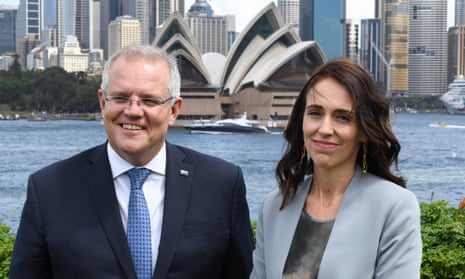Australia’s policy of deporting New Zealand born – but Australian raised – citizens has been a source of political tension for years. But Jacinda Ardern’s step of fronting Australian prime minister Scott Morrison, in the most calculated and public way possible, took it to a new level. Until now, Ardern has played nicey nicey with foreign leaders, even when there are yawning gaps in their political ideologies. Imagine the list of issues she could have had a crack at Donald Trump over at their meeting last year.
So why this issue, and why now?
Because on a domestic level – with an election fast approaching – it’s a low-risk, win-win issue for Ardern. Her supporters want to see her ruffle feathers internationally on issues of principle and humanitarianism, especially at a time when critics say she has been too pragmatic.
Compassion, particularly when it comes to migrants, is one of her defining political characteristics, and in Scott Morrison she has almost the perfect foil. Standing up for the rights of New Zealand citizens abroad is always a winner. And, as much as Ardern would deny it, her demand for Australia to stop sending their criminals to our country will be attractive to swinging voters here. Polls show she needs to win over another 5% to be sure of staying in government.
Australia have point blank refused to change their deportations policy, and needed to be called out on this. Not only is the policy inhumane and one that New Zealand does not impose on Australia, New Zealanders are the largest single group incarcerated in Australia’s infamous detention centres.
The issue goes beyond people convicted of crimes. Ardern also called out Morrison on how Kiwis in Australia, despite paying taxes and levies, are denied access to services they pay for.
Over the past generation there has been massive migration from New Zealand to Australia, so the issue impacts on hundreds of thousands of New Zealanders (many of whom can still vote here), as well as their relatives back in New Zealand.
Ardern also needed to head off some domestic political headwinds. It’s election year and National started the year ramping up talk about criminal gangs in New Zealand. While that’s to be expected every election year, there is evidence that the Australian deportation policy has contributed not just to growth in criminal activity but, alarmingly, to the establishment of a whole new gang culture imported from Australia.
Ardern needed to be seen to be doing something about it, and directly confronting Morrison on his home turf certainly got everyone’s attention. Making this stand on the international stage, in such a commanding fashion, also ensured that opposition leader Simon Bridges was overshadowed and left with few options to attack her on.
However, down the track Bridges may be able to make some political capital, as Ardern’s government is already under pressure for talking a big game but not delivering. And questions are being asked here about whether she is prepared to front her coalition partner NZ First over any attacks they make on migrants, which is their go-to hot-button election strategy.
The problem with direct attacks on other country’s leaders is that, unless you have some serious leverage on them, it can be seen as posturing without substance. Fronting Scott Morrison publicly will at least buy her some time, while she figures out a practical response.
It’s clear Australia will not change this policy anytime soon – deporting criminals is popular in Australia for the very same reasons it’s unpopular here.
The challenge for Ardern will be, having made the big stand, and profited from it at home in the short term, what is she actually going to do about it?
Bryce Edwards is a senior associate at the Institute for Governance and Policy Studies at Victoria University, Wellington, New Zealand
